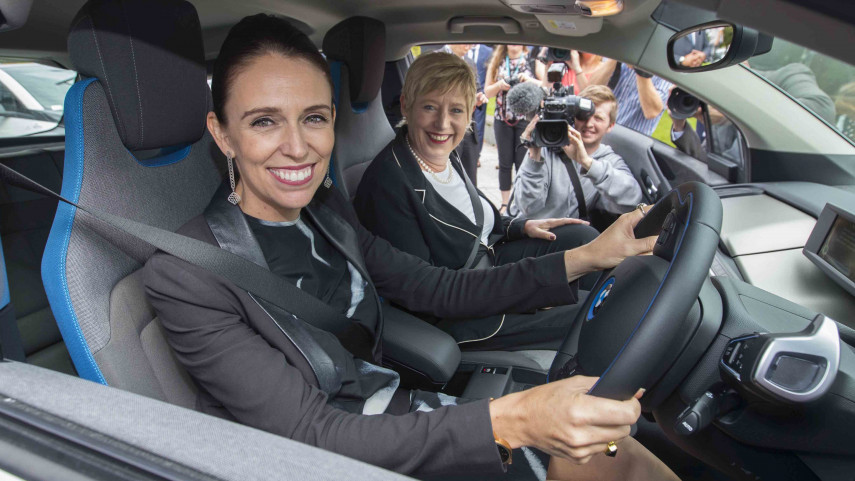
Car sharing service sparks high-powered buzz

Share this story
Prime Minister Jacinda Ardern and Mayor Lianne Dalziel have officially launched Christchurch’s first fully battery powered electric car sharing service.
The Christchurch City Council initiated, researched and developed the car sharing service, which is the first of its kind in New Zealand.
The Council, the Ara Institute, Aurecon, Beca, the Canterbury District Health Board, Chapman Tripp, Christchurch International Airport, Environment Canterbury, Jacobs, Meridian Energy, Tonkin and Taylor, and Warren and Mahoney are the foundation members of the scheme, which is being run for them by Yoogo Share.

Prime Minister Jacinda Ardern and Mayor Lianne Dalziel try out one of the battery electric cars.
From today other Christchurch businesses and the public can access the battery electric vehicles in the service’s fleet.
Mayor Lianne Dalziel says she is proud that Christchurch is the first city in New Zealand, and one of the few cities internationally, that has a battery electric car sharing service.
“Our purpose here today may not have been in any blueprint, but it is as much a part of our regeneration as is any project that was envisaged. It is about who we are as a city – New Zealand’s 21st century Garden City putting sustainability to the fore.
“This service will deliver improved environmental and health outcomes and help the Council achieve its goal of becoming carbon neutral by 2030,'' the Mayor says.
"It’s a smart and sustainable way for businesses and for local residents to get around town and I'm excited to see the service grow. This is way of the future.’’
Prime Minister Ardern says encouraging the use of electric vehicles is an important part of the Government’s plan for New Zealand to become carbon neutral by 2050.
“It’s great we could help Christchurch lead the way with this innovative car sharing scheme,’’ she says.
Yoogo Share General Manager Kirsten Corson says the company is looking forward to opening up the car share service to the public.
The first stage of the car sharing service has started with Hyundai Ioniq and BMWi3 vehicles now available at hubs in the Christchurch Art Gallery Te Puna o Waiwhetu car park, the West End car park, and at Christchurch International Airport.
In April, further hubs will be added at The Crossing car park, the Ara Institute, Canterbury University, Papanui and Fendalton libraries, and the Lyttelton Community Centre.
By then there will be 100 battery electric vehicles at 10 or more hubs across the city.
“This is an exciting new transport service powered by electricity that is largely generated from renewable energy,’’ says Kevin Crutchley, the Council’s Resource Efficiency Manager and project manager for the scheme.
“The result is a service with zero tail pipe emissions that will both reduce our city’s greenhouse gas emissions and improve air quality, which will have positive health benefits for the residents of Christchurch,’’ he says.
The Christchurch Agency for Energy Trust was a foundation funding supporter for the service, providing a grant towards the electrical and charging infrastructure for the hub roll-out.
The Energy Efficiency and Conservation Authority has provided funding towards stage two of the service through its Low Emission Vehicles contestable fund.
